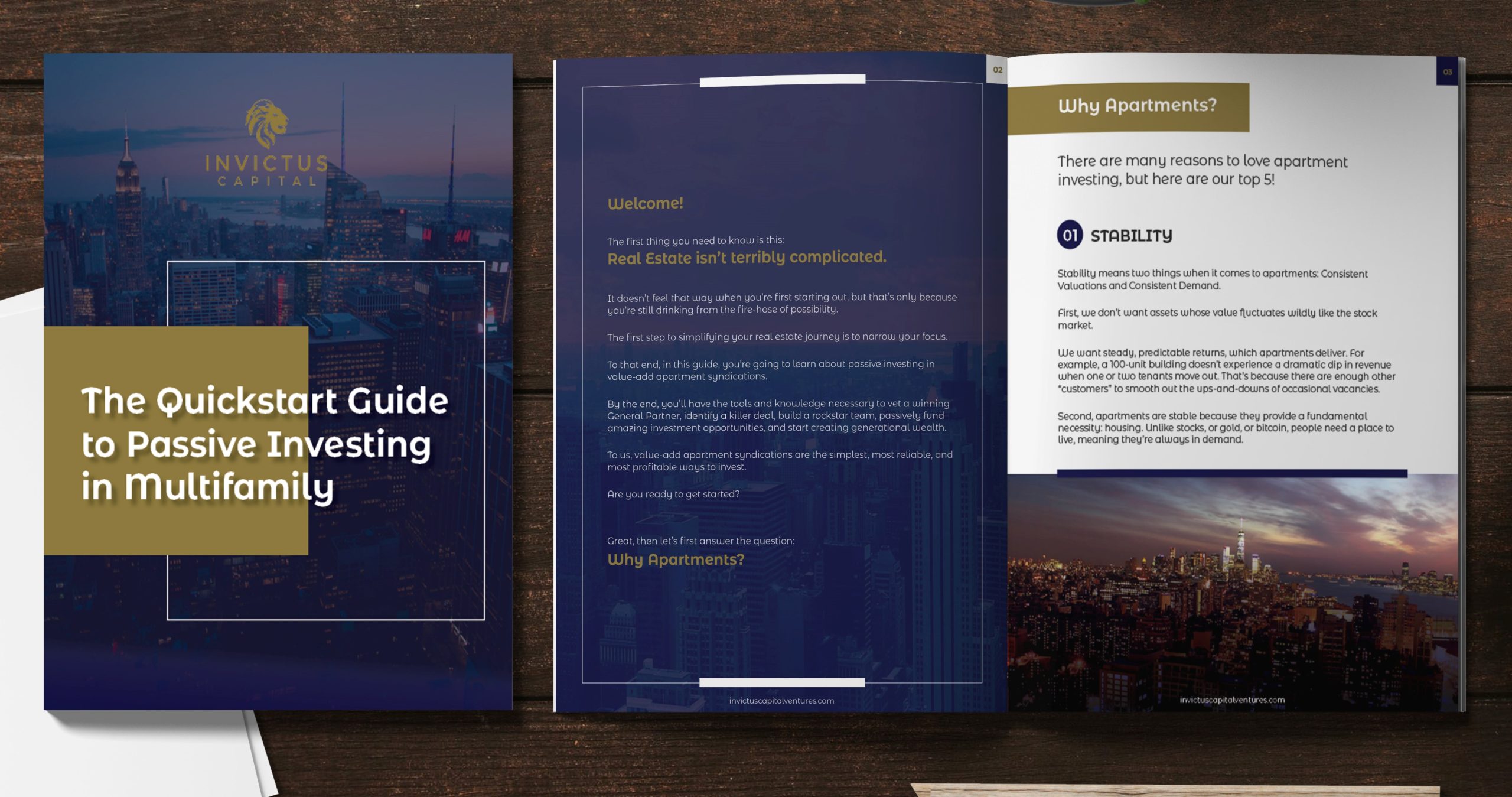
How to Approach a Commercial Broker
RE stands for Relationships, not Real Estate.
Multifamily investing is a people game. Of course, there is a significant amount of education, capital, and time required, but nothing in this industry ever occurs without multiple people coming together to make it happen.
Of all the people you will work with over the course of your real estate career, few are more important than your broker.
A great broker can keep your deal flow flush with opportunities, can serve as an incredible source of insight into the trends of your market, and they can be a hub of referrals for other professionals in your market that you’ll inevitably want to add to your team.
So it’s vital that you consider from the outset of your investing journey how you forge a meaningful relationship with your broker.
To that end, you need to understand three things:
- How a commercial broker works
- Why you should care what they think
- When you should contact them
How does a commercial broker work?
In a commercial transaction, typically the broker will handle both sides of the equation. They are the gatekeeper of opportunity as they are the one pounding the pavement and making phone calls to potentially interested sellers.
Once located, the broker will approach their library of potential buyers who they think might be interested in the details of that particular deal.
The broker isn’t simply representing the seller or the buyer. They are trying to find a mutually beneficial opportunity for all parties involved.
This is fundamentally different from your typical residential deal.
Why should you care what a commercial broker thinks?
First, you need to care for no other reason than the fact the commercial broker is the one with the deal in hand.
Second, and more important, the broker is (or at least should be) the expert in that particular market. This is what they do all day.
Assuming you trust their judgment and motivations, you would be wise to extract as much information from your broker as possible.
When should you contact a commercial broker?
Don’t make a rookie mistake here: Fight the urge to approach a commercial broker until you have at least some of your ducks in a row.
Remember, first impressions are hard to break, and you only get one chance to be taken seriously by a commercial broker.
Which makes sense, because these guys and gals are busy. Their livelihood depends on closing deals. If they get the sense that you don’t know what you’re talking about (or what you’re even looking for), they’ll drop you like a hot potato and you’ll never hear from them again.
So how do you know when you’re ready?
When you’ve done the following three things:
1) Get Educated
This should go without saying, but you need to have at least a baseline understanding of real estate investing. If you aren’t familiar with terms such as cap rate, NOI, IRR, value-add, or cash-on-cash return, then you aren’t ready to speak a commercial broker.
Simply put, you must speak their language.
2) Study Your Market
Once you have a solid grasp of the fundamentals, it’s time to go deeper and really research the market you’re looking to invest in.
The commercial broker is an expert in the market you’re interested in, which means you should definitely pick their brains for insights, but this presumes you’ve done some amount of heavy lifting in the research department so you can actually have a beneficial conversation.
Where to start?
When evaluating a market, you should know things such as: What’s the employment growth like? Where is the growth concentrated? What’s driving that growth? What are the local market trends doing? Any interesting interplays within the local government that would pertain to this market?
3) Know Your Criteria
Before you whip out the yellow pages to find the best commercial broker in town, you need to know exactly what you’re looking for in terms of investment opportunities.
If you can’t clearly articulate what would make for a good deal in your eyes, then you have no business going to a commercial broker.
Get clear about what it is you’re looking for.
There are few things that a broker wants to hear less than: I’m open to whatever. You might as well be saying, “I don’t have a clue what I want.”
If you don’t know what you want, the broker is likely not interested in wasting their time to help you figure it out.
Why?
Because brokers are busy, and their business depends on their ability to close deals.
Who are they more likely to give their time to: Somebody who knows exactly what they’re looking for or somebody who is still testing the waters of infinite possibility?
Exactly.
So, get clear on what it is you’re looking for.
You should be able to answer questions about property class, asset class, rent, price point, class of neighborhood, age, type of value-add, occupancy.
Once you’ve educated yourself, you’ve studied your market, and you know exactly what you’re looking for, it’s time to reach out to the broker.
Own the Conversation
You must position yourself as an expert investor. To do this, you must control the conversation and direct it where you want it to go.
Trust me, the broker wants this.
They want to know that you know what you’re doing, where you’re doing, and how you’re getting there.
Being passive in the conversation and letting the broker ask all the questions is no way to accomplish this goal.
So be confident, direct, and poised. Display your expertise by asking questions with purpose and to verify your own findings.
Done correctly this serves to position them as the expert broker whose advice and opinion you value, without conveying the image of being the apprentice.
Avoiding the Common Traps
A broker’s time is a finite resource. The most successful brokers in a market guard their time with fervor. They don’t waste it on conversations they suspect will go nowhere.
Here are a couple common traps brokers lay to weed out the serious players from the casual onlookers.
“What cap rate are you looking for?”
On the surface this seems an innocent enough question. Cap rates are an important metric for determining an investment’s valuation.
Surely this is something you need to know, right?
Well, yes and no.
Yes, in that it’s helpful to know the general cap rate in a market.
But ultimately at this stage in the conversation the real answer is: No, the cap rate doesn’t matter.
Savvy investors don’t care what the cap rate is if the property hits their underlying investment goals.
If you are seeking 10% cash-on-cash with an 18% IRR, then it doesn’t really matter if the cap rate is 4% or 11%.
All that matters to you is that the property, at whatever cap rate it is selling, yields those returns.
Let the broker know as much.
“I have a property that would work well…”
Straight out of the gate, the broker is likely to send you a real turd of a deal. It may, or may not, even remotely resemble what you are looking for.
Tell the broker you are looking for 50-100 unit multifamily within five miles of downtown and they send you a 10 unit, mixed use space out in the suburbs, then you need to pump the brakes, because this is a test.
This isn’t what you’re looking for and the broker (if you’ve been clear about your search parameters) knows it too.
Stick to your guns and don’t go chasing something just because you’re excited a broker has finally sent something your way.
Few things will label you as an inexperienced investor faster than jumping from deal to deal.
Know your criteria and stick to it.
“Can you send me proof of funds?”
If you’ve gotten to the point where the broker is asking for proof of funds, you’ve probably gone wrong someplace.
That’s not to say the situation can’t still be salvaged, however.
First, let’s talk about how to avoid this question.
When you approach a broker, it’s important to know that they are putting you through a filter. They’re trying to figure out:
Does this person know what they’re doing, do they have a plan, and can they execute that plan?
Do the broker a favor and answer these questions for them by clearly articulating both your investment criteria and how you plan fund that investment.
Know your money.
Specifically, know your debt and your equity.
What type of debt do you plan to use (Agency, Bridge, Portfolio)? Hopefully you’ve already spoken to some lenders so you have some names to reference to show the broker you’ve already begun down this path.
On the other side, where do you plan to come up with the equity? Are you syndicating, using your own money, or joint venturing with a small group?
Address this elephant in the room confidently and on your own terms. If the broker has to ask, then it’s likely they already have doubts.
Now, in the best case scenario you’ve addressed the financing early in the conversation, but let’s say you didn’t, and now the broker is asking for proof of funds.
What do you do?
Step One: Don’t Panic.
Step Two: Realize that in most instances (especially in a syndication or a joint venture) the funds aren’t just sitting around waiting to find a deal. In fact, a typical syndication is going to operate exactly the opposite.
First the deal is found and then the funds are raised.
The broker knows this. They should expect this.
Don’t be afraid to own this truth.
At all points during your first conversation with a broker they are trying to determine one thing: Can this person close a deal?
If they believe the answer is no, you’re not going to get very far with them.
But if you get educated, study your market, and know your criteria, you’ll position yourself in the broker’s mind as a person they want to do business with.
And that’s how you create a successful broker relationship.

